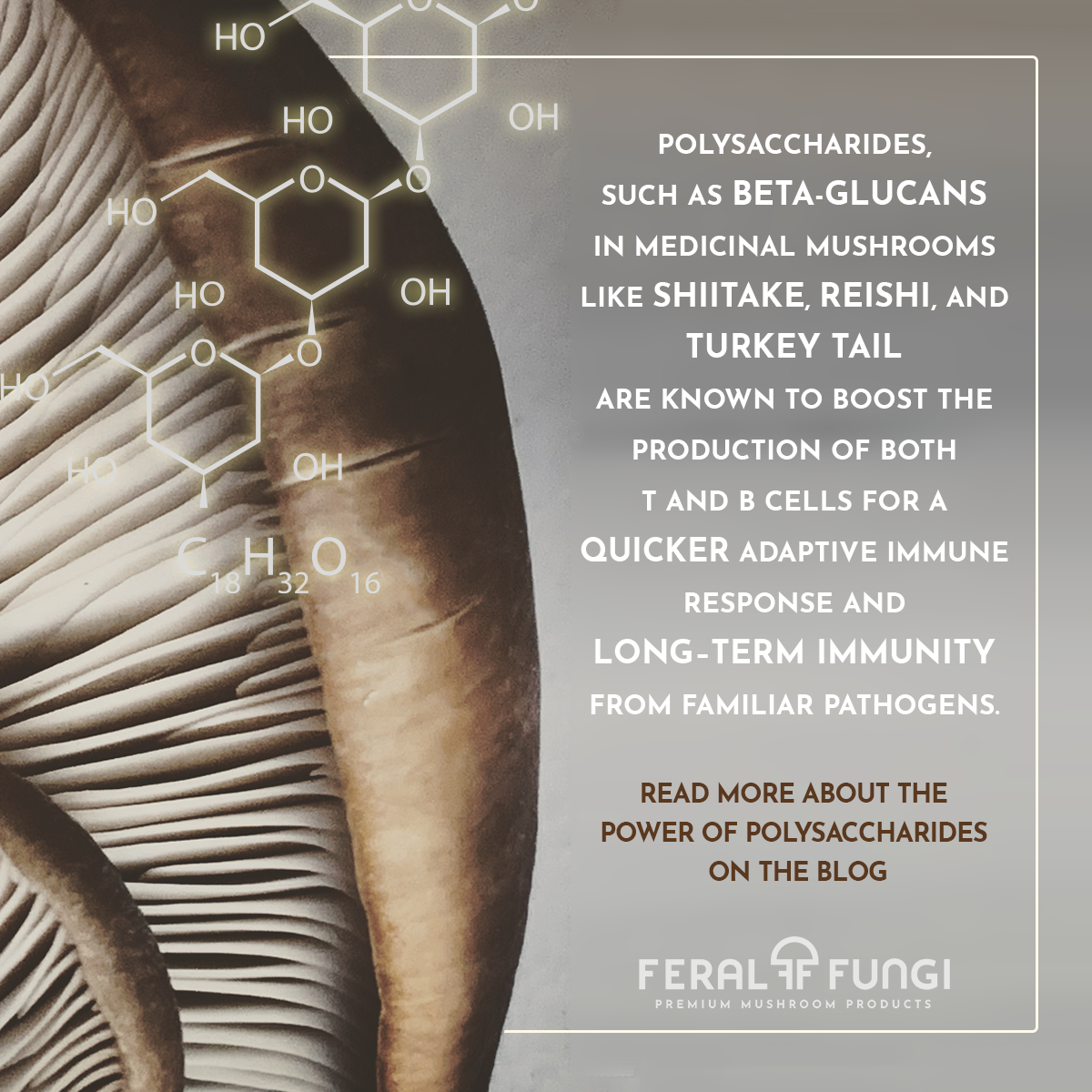Power of Polysaccharides in Mushrooms

In recent years, medicinal mushrooms have gained widespread recognition for their remarkable health benefits, particularly in supporting the immune system. These fungi, long used in traditional medicine worldwide, owe much of their immune-supporting abilities to a group of complex carbohydrates known as polysaccharides. Found in mushrooms like reishi, shiitake, and turkey tail, polysaccharides are known to support the body’s natural immune response. By supporting the body’s ability to stimulate immune cells and a healthy inflammation responses, these compounds are emerging as an effective way to maintain health and resilience, especially during times of stress or illness.
What Are Polysaccharides?
Polysaccharides are complex, long-chain carbohydrates that have been extensively studied for their potential effects on the immune system. They are complex molecules comprising long chains of monosaccharide units (simple sugars like glucose) linked together. Each type of polysaccharide has a unique role in biology. Some are used by organisms to store energy like starch or glycogen, some are purely structural (like chitin in fungi), and others are functional, which provide immune modulation and antioxidant activity. In the functional group, beta-glucans are particularly notable for their immunomodulatory properties and are found abundantly in fungi.
The Complex Immune System
The immune system has two components: the innate and adaptive (or active) immune systems. Simply put, the innate immune system serves as the body’s first line of defense, responding quickly—within minutes or hours—to threats in a broad, non-specific manner. It fights infections by enlisting immune cells like macrophages, neutrophils, dendritic cells, and natural killer (NK) cells to non-discriminatorily seek out pathogens. However, it lacks memory and responds to infections the same way each time. Medicinal mushrooms’ polysaccharides stimulate the production of these specialized cells on the front lines, fending off bacteria, viruses, and pathogenic fungi as they enter the body.
In contrast, the adaptive immune system is slower to activate but provides a more targeted, powerful defense. It recognizes specific pathogens and mounts a tailored response using specialized B cells and T cells. The adaptive immune system’s most crucial feature is its ability to "remember" pathogens by creating memory cells. This allows for faster, more effective responses when the same pathogen is encountered again. The polysaccharides, particularly beta-glucans in medicinal mushrooms like shiitake, reishi, and turkey tail are known to boost the production of both T and B cells for a quicker adaptive immune response and long-term immunity from these familiar pathogens.
Polysaccharides and Immune Health
Mushroom polysaccharides stimulate various immune cells, including natural killer (NK) cells, macrophages, T-cells, and B-cells, enhancing both innate and adaptive immunity. Research shows that beta-glucans, heteroglycans, and polysaccharide-protein complexes—exhibit a full spectrum of immunomodulatory effects, depending on their structure and composition.
Additionally, mushroom polysaccharides increase the production of antibodies, such as IgA, IgM, and IgG, in response to infections. This boost in humoral immunity improves the body’s defenses in mucosal areas like the respiratory and digestive tracts, preventing pathogens from penetrating tissues. Enhanced antibody production also leads to more effective pathogen neutralization and stronger, long-lasting immune responses.
These bioactive compounds help the body protect itself from pathogens but also show promise in treating and preventing diseases, including cancer. Both animal and human clinical research studies suggest that mushroom polysaccharides can enhance immune function, improve survival rates in cancer patients, and modulate immune responses in healthy individuals. Their diverse immunomodulatory properties make them valuable candidates for many therapeutic applications.
Key Mushrooms Rich in Polysaccharides
While all mushrooms contain polysaccharides as part of their cell wall structure, some species have particularly high concentrations, making them medicinally valuable. Turkey tail (Trametes versicolor) is rich in polysaccharopeptides (PSP) and polysaccharide-K (PSK), both of which have been extensively studied for their immune-boosting effects. Other notable mushrooms include reishi (Ganoderma lucidum), maitake (Grifola frondosa), shiitake (Lentinula edodes), chaga (Inonotus obliquus), cordyceps (Cordyceps militaris), and lion’s mane (Hericium erinaceus).
Additional Compounds in Medicinal Mushrooms
Polysaccharides aren’t the only compounds responsible for the health benefits of medicinal mushrooms. These fungi also contain potent compounds like triterpenes (found in reishi, chaga, and others), sterols, ergosterol (provitamin D2), antioxidants, proteins, enzymes, phenolic compounds, prebiotics, and adenosine (found in reishi and cordyceps). Together with polysaccharides, these compounds create a synergistic effect that enhances the therapeutic full spectrum benefits of medicinal mushrooms.
Incorporating Medicinal Mushrooms and Polysaccharides into Your Daily Routine
Polysaccharides are not unique to mushrooms—they are also found in other whole foods like grains, legumes, vegetables, seaweed, fruits, tubers, nuts, and seeds. However, including medicinal mushrooms with their wide variety of beneficial constituents, alongside a balanced diet rich in whole foods, offers a unique way to promote immune function, support gut health, and provide sustained energy. Incorporating these powerful fungi into your daily routine can help you achieve and maintain optimal health.
0 comments

